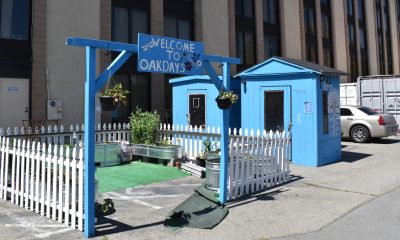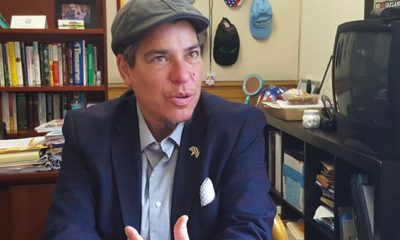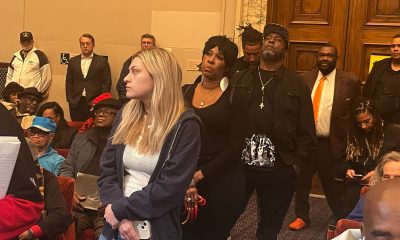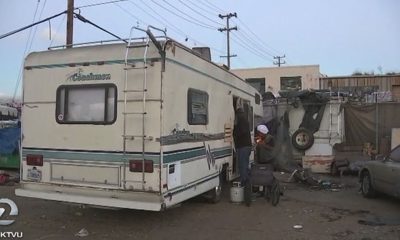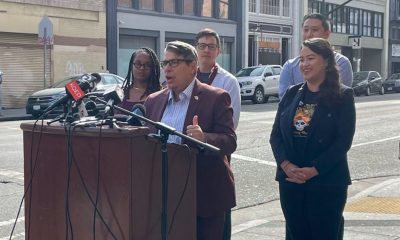City Government
Oakland to Determine Shelter Options for Evicted Homeless People in New Year

During a meeting on December 15, Oakland’s City Council discussed defining what shelter options Oakland would be required to offer homeless people if the city clears their communities during the local emergency related to the COVID-19 pandemic.
They postponed making a final decision on the matter until the new year. Given dangers posed by the pandemic, the City Council will determining whether it sees it as safe for homeless people to live in homeless shelters.
The City Council unanimously approved the Encampment Management Policy (EMP) on October 20, which set clear parameters for where the City could choose to focus clearances. The resolution stated people living within 50 feet of a residence, business, park or sports court could face eviction. But the EMP did not overturn a resolution Council also unanimously passed on March 27 that requests that the City only execute evictions if “individual housing units or alternative shelter is provided.”
City Administrator Edward Reiskin has proposed using its Community Cabin Program (informally known as the Tuff Shed Program), Safe Parking Lots, trailers operated through Operation HomeBase, limited transitional and permanent housing units, and “congregate shelter with reduced capacity and physical distancing measures.” But in an agenda memorandum, City Council Pres. Rebecca Kaplan and District 2 Councilmember Nikki Fortunado-Bas requested the City “not consider congregate shelter as a form of alternative shelter.”
Kaplan and Bas’ proposed changes to Reiskin’s plan claim that “moving or relocating from an outdoor encampment to an indoor congregate shelter places people at a greater risk for COVID-19 transmission then they would be in by living in an outdoor encampment.” They pointed out COVID-19 outbreaks that have occurred in homeless shelters in San Francisco, Spokane, Wash., Salem, Ore., and Calgary in the Alberta, Canada.
“There’s a number of things we’re doing to try to make congregate shelter as safe as it can be,” said Lara Tannenbaum, of Oakland’s Human Services Dept. during the meeting in response to Kaplan and Bas’ proposal. Tannenbaum as well and Homelessness Administrator Daryel Dunston said the City’s homeless shelters have PPE, use symptom and temperature checks, reduce capacity and carry out COVID testing events.
But even under reduced capacity, the Kaplan and Bas’ memorandum claims that congregate shelter is not a safe option during the COVID-19 pandemic.
“People living in congregate settings comprise less than 1% of the U.S. population, but nearly 50% of coronavirus deaths,” Kaplan and Bas wrote in their proposal.
During the meeting, District 1 Councilmember Dan Kalb asked what specifically Kaplan and Bas’s proposal would change in Reiskin’s proposal. Kaplan responded by saying that it would strike the line that allowed “congregate shelter with reduced capacity.” Bas concurred and added she wanted to expand on language in Reiskin’s proposal that required “reasonable accommodation for mental and physical disabilities.”
On their website, the Center for Disease Control has used the terms “congregate shelter” and “shared shelter” interchangeably. But Kaplan and Bas’ proposed changes focus specifically on homeless shelters, and instead uses the terms “congregate shelter” and “homeless shelter” interchangeably. Their changes, as they currently stand, would effectively ban homeless shelters as an “alternative shelter” option but “shared shelter” would still be allowed.
They have not proposed striking out language that includes the City’s Community Cabins Program as an “alternative shelter” option. The Cabins are shared housing as they require residents to share 8-by-12 foot structures with a roommate.
Council ended their discussion of Bas and Kaplan’s proposed changes when Bas proposed a motion to continue the decision until the next City Council meeting, requesting time to clarify their changes and consider amendments and questions Kalb proposed. The continuance means that exiting Councilmembers Lynette Gibson-McElhaney and Larry Reid will not vote on the proposed changes while entering Councilmembers Carroll Fife and Treva Reid will.
Homeless Resident Pastor Preston’s Experience, and Proposed Alternative Solutions from the Community:
Preston Walker, a 63-year-old Oakland native and unhoused resident better known as “Pastor Preston,” has lived in a Days Inn hotel room through a state and county funded program called Project Roomkey. He qualified to obtain the room, which is neither congregate nor shared shelter, but a private unit, due to an immune disorder that makes him more susceptible to pneumonia and COVID-19.
“This hotel here is a blessing for me,” said Preston. “This is the first time eight years that I had my own personal space where I didn’t have to worry about theft. The sad thing is if it wasn’t for the virus this never would have happened.”
Preston, who has spent time in both the Community Cabins and homeless shelters in Oakland and throughout the Bay Area, expressed skepticism of sharing space with people during the pandemic. He stressed that it would be impossible for people to wear masks all the time in shelters due to people having to eat. He worried about the particularly close quarters people in the Community Cabins have to live under and their lack of control over who they live with. Preston ended his three-month stay in the Community Cabins in late 2019 due to a roommate who smoked crystal meth in their shared space, which made it difficult for Preston to breathe or sleep well.
Since the Federal Emergency Management Agency announced on December 18 that it will continue to fund Project Roomkey through the duration of the pandemic, Preston will continue to be secure in his hotel room. But at the time of this writing about 30% of the hotel rooms secured by the state of California sit vacant, and activists have called on state, county and city governments to fill them and secure more rooms through state-of-emergency powers. The housing and racial justice non-profit, Just Cities, has repeatedly called on Oakland to make use of its 50-plus acres of vacant public land to shelter its homeless people.
Activism
S.F. Black Leaders Rally to Protest, Discuss ‘Epidemic’ of Racial Slurs Against Black Students in SF Public School System
Parents at the meeting spoke of their children as no longer feeling safe in school because of bullying and discrimination. Parents also said that reported incidents such as racial slurs and intimidation are not dealt with to their satisfaction and feel ignored.

By Carla Thomas
San Francisco’s Third Baptist Church hosted a rally and meeting Sunday to discuss hatred toward African American students of the San Francisco Unified School District (SFUSD).
Rev. Amos C. Brown, president of the San Francisco NAACP and pastor of Third Baptist Church, along with leadership from local civil rights groups, the city’s faith-based community and Black community leadership convened at the church.
“There has been an epidemic of racial slurs and mistreatment of Black children in our public schools in the city,” said Brown. “This will not be tolerated.”
According to civil rights advocate Mattie Scott, students from elementary to high school have reported an extraordinary amount of racial slurs directed at them.
“There is a surge of overt racism in the schools, and our children should not be subjected to this,” said Scott. “Students are in school to learn, develop, and grow, not be hated on,” said Scott. “The parents of the children feel they have not received the support necessary to protect their children.”
Attendees were briefed last Friday in a meeting with SFUSD Superintendent Dr. Matt Wayne.
SFUSD states that their policies protect children and they are not at liberty to publicly discuss the issues to protect the children’s privacy.
Parents at the meeting spoke of their children as no longer feeling safe in school because of bullying and discrimination. Parents also said that reported incidents such as racial slurs and intimidation are not dealt with to their satisfaction and feel ignored.
Some parents said they have removed their students from school while other parents and community leaders called on the removal of the SFUSD superintendent, the firing of certain school principals and the need for more supportive school board members.
Community advocates discussed boycotting the schools and creating Freedom Schools led by Black leaders and educators, reassuring parents that their child’s wellbeing and education are the highest priority and youth are not to be disrupted by racism or policies that don’t support them.
Virginia Marshall, chair of the San Francisco NAACP’s education committee, offered encouragement to the parents and students in attendance while also announcing an upcoming May 14 school board meeting to demand accountability over their mistreatment.
“I’m urging anyone that cares about our students to pack the May 14 school board meeting,” said Marshall.
This resource was supported in whole or in part by funding provided by the State of California, administered by the California State Library via California Black Media as part of the Stop the Hate Program. The program is supported by partnership with California Department of Social Services and the California Commission on Asian and Pacific Islander American Affairs as part of the Stop the Hate program. To report a hate incident or hate crime and get support, go to CA vs Hate.
Bay Area
Mayor London Breed: State Awards San Francisco Over $37M for Affordable Housing
On April 30, Mayor London N. Breed announced San Francisco has been awarded more than $37.9 million in funding from the California Department of Housing and Community Development (HCD) as part of the State’s Multifamily Housing Program (MHP). The HCD loan will provide the final funding necessary for development of Casa Adelante – 1515 South Van Ness, a 168-unit affordable housing project located in San Francisco’s Mission District.
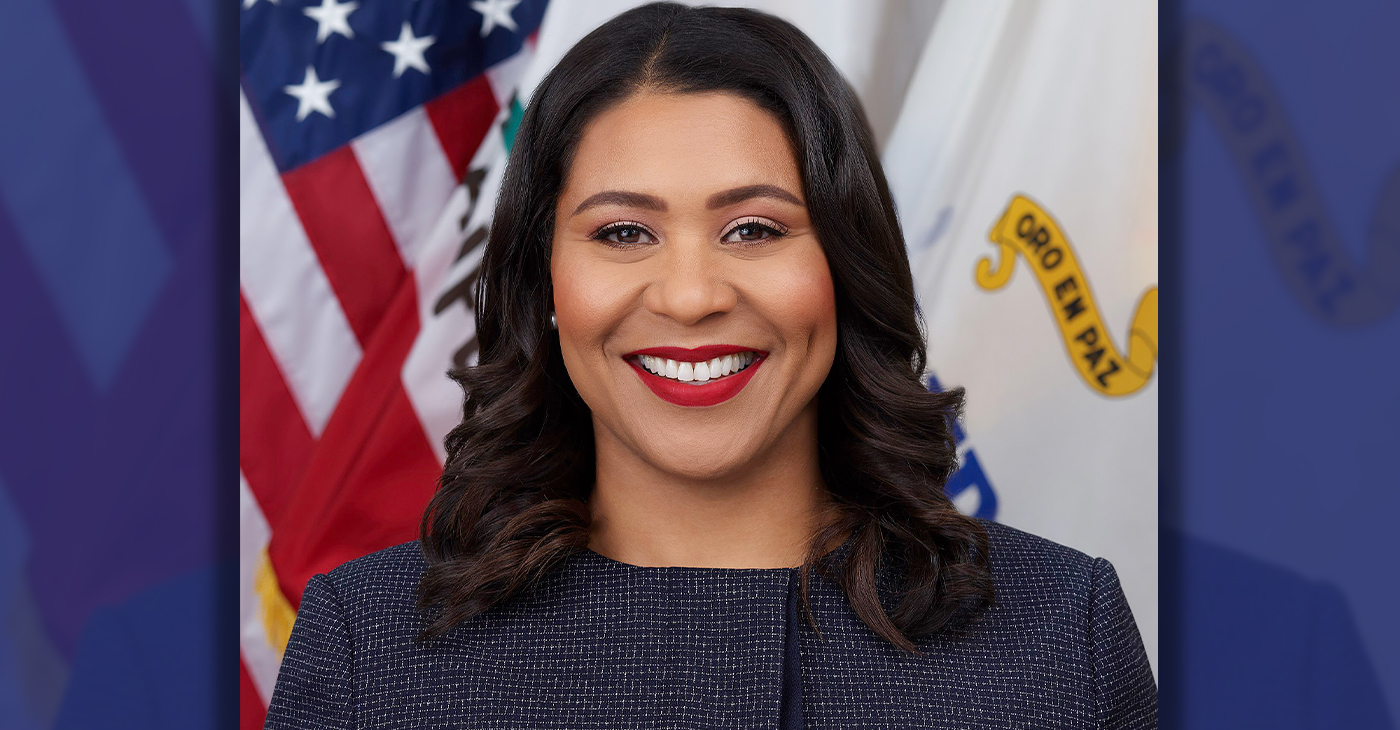
By Oakland Post Staff
On April 30, Mayor London N. Breed announced San Francisco has been awarded more than $37.9 million in funding from the California Department of Housing and Community Development (HCD) as part of the State’s Multifamily Housing Program (MHP).
The HCD loan will provide the final funding necessary for development of Casa Adelante – 1515 South Van Ness, a 168-unit affordable housing project located in San Francisco’s Mission District.
The new development at 1515 South Van Ness Ave. will provide 168 affordable homes to low-income families, formerly homeless families, and persons living with HIV earning between 25-80% of the San Francisco Area Median Income (AMI).
In addition, the project is anticipated to provide family-friendly amenities and ground floor community-serving commercial spaces that preserve the prevailing neighborhood character of the Calle 24 Latino Cultural District.
“This funding unlocks our ability to move on building affordable housing units for families in San Francisco at a crucial time. We understand the level of need for more housing that is accessible, and like the state, the city continues to face a challenging budget cycle,” said Breed. “1515 South Van Ness is a good example of what can be achieved in San Francisco when you have strong community partnerships and an unwavering commitment to deliver on critical needs for our residents.”
“From the beginning of my term as Supervisor, I have fought to bring affordable housing to 1515 South Van Ness” said Supervisor Hillary Ronen. “In the interim, the site has been utilized for homeless services and shelter, and I am thrilled that HCD has recognized the value of this development, and we are finally ready to break ground and bring 168 affordable homes to low income and formerly homeless families in the Mission.”
Owned and occupied by McMillan Electric Company until 2015, the City and County of San Francisco purchased 1515 South Van Ness Avenue in June 2019 with the intent of developing new affordable housing.
In November 2020, the San Francisco Mayor’s Office of Housing and Community Development (MOHCD) released a Multi-site Request for Qualifications (RFQ) seeking qualified developers to build affordable housing on the site, and subsequently selected Chinatown Community Development Corporation (CCDC) and Mission Economic Development Agency (MEDA) in May 2021 to develop the site.
The project is expected to begin construction in winter 2025.
“A strong, long-term push by Mission advocates to make this site 100% affordable is now paying off, with 168 family units that include services and childcare. People of color communities know what they need, and we are excited to be in partnership with a team, consisting of MEDA, CCDC, and MOHCD, that listens,” said Malcolm Yeung, Executive Director at CCDC.
“We are excited to be in partnership with CCDC, yet again, and for the opportunity to develop intergenerational affordable housing in the City’s Mission District,” said Luis Granados, executive director at MEDA.
Increasing housing affordable to lower-income and vulnerable residents is a key priority in the City’s Housing Element which calls for additional funding for affordable housing production and preservation, as well as Mayor Breed’s Housing for All Executive Directive that sets out the steps the City will take to meet the bold goal of allowing for 82,000 new homes to be built over the next eight years.
Tuesday’s funding announcement emphasizes the importance of regional and state collaboration in order to reach our housing and climate goals.
“We are thrilled—not just to bring a project of this size to a community with great need — but to do so with community-based developers and their partners who understand the neighborhood and sensitivities around cultural preservation,” said HCD Director Gustavo Velasquez.
City Government
Vallejo Continues to Accept Applications for Boards, Committees and Commissions
The City of Vallejo is requesting applications to serve on a number of the City’s boards and commissions. Vallejo residents who are interested in serving on an advisory body are invited to submit an application and supplemental questionnaire for consideration.

By City of Vallejo
The City of Vallejo is requesting applications to serve on a number of the City’s boards and commissions. Vallejo residents who are interested in serving on an advisory body are invited to submit an application and supplemental questionnaire for consideration.
There are currently openings on the following boards, commissions, and committees:
- Beautification Commission(2) terms expire 6/30/28
- Civil Service Commission(2) terms to expire 6/30/28
- Design Review Board(2) terms to expire 6/30/28
- Housing & Community Development Commission(1) term to expire 6/30/28
- Housing Authority(1) tenant commissioner term to expire 12/31/24
- McCune Collection Commission(3) terms to expire 6/30/28
- Participatory Budget Steering Committee(6 members & 3 alternates) terms expire 6/30/25
- Planning Commission(2) terms to expire 6/30/28
- Surveillance Advisory Board – Districts 1, 2, and 3 Members OnlyDistricts 1 & 3 terms to expire 1/2/25 and District 2 term to expire 1/5/27
- Sister City Commission(1) term to expire 6/30/27
- Solano Commission for Women & Girls(1) Vallejo representative can be youth or adult. Term to expire 4 years from date of appointment
For City Boards and Commissions, except for the Civil Service, McCune Collection, and Sister City Commissions, the Surveillance Advisory Board, and the Participatory Budgeting Steering Committee, all appointed members must complete and file a Statement of Economic Interests, Form 700, within 30 days of appointment.
All City Board and Commission members must complete AB 1234 Ethics training and file a Certificate of Completion within 30 days of appointment.
In most instances, to be eligible for appointment, applicants must be residents of the City of Vallejo. Information regarding the duties of each board and commission and specific criteria for appointment may be found within each application. With some exceptions, appointments are typically for a term of four years.
The application period will remain open until a sufficient number have been received in the City Clerk’s Office
Interviews with the City Council are tentatively scheduled for the evenings of June 3 and 10. Applicants must attend the interview to be considered for appointment on a board or commission.
Application forms and supplemental questionnaires are accessible in several ways:
- The City’s website, located on the Boards and Commissions page
- At City Hall, Office of the City Clerk, 555 Santa Clara Street, 3rd Floor, Vallejo, CA
- By Email at abrahamson@cityofvallejo.net, or by phone at (707) 648-4527
By U.S. Mail: City of Vallejo, C/O City Clerk, PO Box 3068, Vallejo, CA 94590
-

 Community3 weeks ago
Community3 weeks agoFinancial Assistance Bill for Descendants of Enslaved Persons to Help Them Purchase, Own, or Maintain a Home
-

 Business3 weeks ago
Business3 weeks agoV.P. Kamala Harris: Americans With Criminal Records Will Soon Be Eligible for SBA Loans
-

 Activism4 weeks ago
Activism4 weeks agoOakland Post: Week of April 10 – 16, 2024
-

 Community3 weeks ago
Community3 weeks agoAG Bonta Says Oakland School Leaders Should Comply with State Laws to Avoid ‘Disparate Harm’ When Closing or Merging Schools
-

 Activism2 weeks ago
Activism2 weeks agoOakland Post: Week of April 24 – 30, 2024
-

 City Government3 days ago
City Government3 days agoCourt Throws Out Law That Allowed Californians to Build Duplexes, Triplexes and RDUs on Their Properties
-

 Community2 weeks ago
Community2 weeks agoRichmond Nonprofit Helps Ex-Felons Get Back on Their Feet
-

 Community2 weeks ago
Community2 weeks agoOakland WNBA Player to be Inducted Into Hall of Fame


